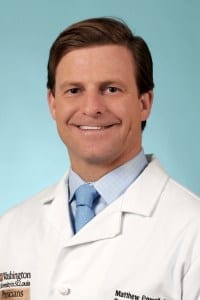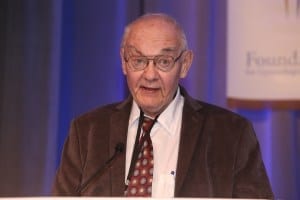
Survey of sexual harassment and gender disparities among gynecologic oncologists | Marina Stasenko, MD
NRG Oncology trial sets new standard regimen for women with uterine carcinosarcomas | Matthew A. Powell, MD
Genetic cancer pioneer Dr. Henry Lynch dies at 91
SGO/FWC signs on to Medicare comment letter for genetic testing
SGO 50th Anniversary: Linda Duska, MD
Race to End Women’s Cancer: Connect with your patient community beyond the care setting
Survey of sexual harassment and gender disparities among gynecologic oncologists | Marina Stasenko, MD

Marina Stasenko, MD
“Everyone seems to have a story,” my colleague remarked while we were discussing the recent #MeToo movement, “even gynecologists.” This conversation bore the idea for a research study – to objectively evaluate whether sexual harassment and gender disparities were an issue in our own community of gynecologic oncology. In order to take the informal anecdotes that women were sharing and get a real sense of the landscape in gynecologic oncology, we designed a survey study looking at perceived experiences with sexual harassment and gender disparities.
The anonymized survey was sent to 1,566 U.S.-based physician members of the Society of Gynecologic Oncology. We received 402 responses, for a response rate of 26%: 63% were female and 37% were male. Mirroring the gynecologic oncology community, female respondents were significantly younger, more racially and ethnically diverse, and at an earlier point in their career than male respondents. Overall, 64% of study participants reported experiencing some form of sexual harassment on at least 1 occasion either during their training or during their years of practice: 71% of female respondents and 51% male respondents. About half of female and a quarter of male respondents reported having been subjected to offensive sexist remarks. About a quarter of males and females had been subjected to unwanted sexual advances. Alarmingly, 1 in 25 (4%) female and 1 in 50 (2%) male respondents had been asked to exchange sexual favors for an academic position or other reward. Of those that had experienced these behaviors, only 14.5% reported the incident. Unfortunately, of those that did report, 65% were dissatisfied with how the incident was resolved/handled.
Participants were also asked about their perceptions of how gender affects their careers and income. Over 70% of male respondents reported no obstacles to advancement in their careers, compared to a about a third of female respondents. In regard to income and salary, 81% of males felt that gender did not play a role in determining their salary, compared to a third of female respondents. Interestingly, despite the 2015 Society of Gynecologic Oncology practice survey showing a significant difference between mean salary for male and female physicians, 91% of male and 57% of female respondents felt that there was no gender pay difference.
The study was presented at the 2019 ASCO meeting and released as a late breaking abstract. During the presentation, while much of the data (unfortunately) did not surprise the audience, several audience members did express their disbelief at the number of male responders that had reported sexual harassment. While the study was voluntary and selection bias may have affected the results, we think that it is also possible that given today’s hyperaware environment with #MeToo and #TimesUp, men are more willing to talk about their experiences with being on the receiving end of sexual harassment behaviors.
Our study brings up as many questions as it answers: who is doing the harassing? what about harassment in physician-patient interactions? Perhaps the most important question is: where do we go from here? Study participants were able to comment on what changes they wanted to see implemented. Common themes included improvement of anti-sexual harassment policies, increased female leadership, more transparency in hiring and promotions, and a general acknowledgement that sexual harassment and gender disparities exist. We hope that our survey acts as a match to ignite the fire of action around sexual harassment and gender disparities within our specialty.
Marina Stasenko, MD, lead study author of Survey of sexual harassment and gender disparities among gynecologic oncologists, is a fellow in gynecologic oncology at Memorial Sloan Kettering in New York City.
NRG Oncology trial sets new standard regimen for women with uterine carcinosarcomas | Matthew A. Powell, MD

Matthew A. Powell, MD
Results from the phase 3 NRG Oncology clinical trial GOG 0261 comparing paclitaxel plus carboplatin (PC) to paclitaxel plus ifosfamide (PI) in women with stage I-IV, recurrent carcinosarcoma of the uterus or ovary, indicate that the PC combination treatment should be considered the standard of care for this patient population. The study concludes that among uterine cancer patients, treatment with PC was not inferior to PI based on overall survival (OS) and PC was associated with longer progression-free survival (PFS) outcomes when compared with PI. These results were recently presented at the American Society for Clinical Oncology (ASCO) Annual Meeting and was awarded a “Best of ASCO” designation.
While they are rare, gynecologic carinosarcomas are extremely aggressive and there has been a great deal of debate surrounding what the ideal or optimal treatment regimen would be for the women who have these malignancies. Previous Phase 2 research suggested that paclitaxel combined with carboplatin may improve outcomes for this patient population in terms of safety and convenience of treatment, so we tested this against a treatment regimen that included paclitaxel and ifosfamide.
Results from the NRG GOG 0261 clinical trial including 449 eligible patients in the primary uterine carcinosarcoma cohort estimate median overall survival at 37 months for those who received PC compared to 29 months for the PI treatment arm (HR = 0.87; 90% CI = 0.70 to 1.075; p < 0.01 for NI, p > 0.1 for superiority (S). Additionally, median PFS was 16 months for women who received PC and 12 months for women who received PI (HR = 0.73; p = < 0.01 for NI, p < 0.01 for S). There was an increased toxicity for the PC treatment which was mostly hematologic, but confusion and genitourinary hemorrhage were significantly worse with PI (Toxicity grade 1/2/3/4/5: PC 1/8/40/48/2%; PI 1/32/39/25/1%).
During treatment, both groups experienced similar decline in QOL and increased neurotoxicity symptoms. There was a similar trend in results noted for the women who participated in the smaller, secondary cohort of patients with ovarian carcinosarcoma with30 month median OS on the PC arm versus 25 months on the PI arm and 15 months median PFS for the PC arm and 10 months for the PI arm.
The hope is to continue to improve survival and quality of life outcomes for women who experience this rare malignancy.
This project was supported by National Cancer Institute (NCI) grants: U10CA180868 (NRG Oncology Operations), U10CA180822 (NRG Oncology SDMC), and U10CA027469 (Gynecologic Oncology Group).
Matthew A. Powell, MD, is an Associate Professor in the Division of Gynecologic Oncology at Washington University School of Medicine in St. Louis and the lead author of the NRG-GOG 0261 abstract: A randomized phase 3 trial of paclitaxel (P) plus carboplatin (C) versus paclitaxel plus ifosfamide (I) in chemotherapy-naive patients with stage I-IV, persistent or recurrent carcinosarcoma of the uterus or ovary: An NRG oncology trial.
Genetic cancer pioneer Dr. Henry Lynch dies at 91

Henry T. Lynch, MD, at the 2014 SGO Annual Meeting on Women’s Cancer in Tampa, FL.
Henry T. Lynch, MD, a pioneer in genetic cancer, died on June 2 at the age of 91. In the 1960s Dr. Lynch researched the medical history data of two extended families, which led him to the discovery of cancer family syndrome (CFS), also known as Hereditary Nonpolyposis Colorectal Cancer (HNPCC) which is now known as Lynch syndrome. At the 2014 SGO Annual Meeting on Women’s Cancer in Tampa, FL, Dr. Lynch received the SGO Innovation Award for his work on hereditary cancers.
“We are deeply saddened by the loss by a truly amazing visionary, physician and scientist. His contributions to the field of cancer genetics are immeasurable and laid the foundation for our understanding of the hereditary basis of cancer,” said SGO President Warner K. Huh, MD.
“The clinical care and management of women with hereditary cancers is now a common component of gynecologic oncology care; this would not have been possible without Dr. Lynch’s contributions and unwavering commitment to his patients, the field and his beliefs,” said Dr. Huh. “His legacy will continue to be palpable for many years to come.”
SGO/FWC signs on to Medicare comment letter for genetic testing
The Society of Gynecologic Oncology (SGO) and the Foundation for Women’s Cancer (FWC) are among 27 organizations that signed on to a letter by Facing Our Risk of Cancer Empowered (FORCE) submitted to the Coverage and Analysis Group at the Centers for Medicare & Medicaid Services regarding the Medicare policy on National Coverage Determination (NCD) 90.2 for Next Generation Sequencing (NGS) for Medicare Beneficiaries with Advanced Cancer (CAG-00450R). The letter recommended that NCD 90.2 be revised to indicate that NGS-based germline genetic tests are exempt from the policy, and that this NCD should specifically apply to somatic mutation testing and be renamed: National Coverage Determination (NCD90.2): Next Generation Sequencing (NGS) for Somatic Mutations.
The comment detailed the following concerns about the policy:
- FDA-approved or -cleared companion in vitro diagnostic and indication prerequisite–This requirement will limit access to most genetic tests for the presence of a germline
mutation. - Requirement for the laboratory test to have an FDA-approved or -cleared indication for use in that patient’s cancer.
- Restricting testing only to those with current, relapsed, refractory, metastatic, or advanced stage III or IV cancer.
- Focus on a technology vs. a test—This NCD focuses on a technology (NGS) rather than a test and its purpose.
“This NCD should strive to provide reasonable and necessary care that aligns with current—and emerging—evidence-based guidelines and medicine,” the letter stated. “Germline tests in appropriate patients have demonstrated utility, meaning that they inform clinical decision-making and facilitate the prevention or amelioration of ‘adverse health outcomes.’”
The comment letter added that “Restriction of patient access to potentially lifesaving tests raises significant concerns. Knowledge of a germline mutation can benefit the individual, their family, and society in general. We urge CMS to seriously consider the implications of this NCD and to take the steps necessary to ensure that it does not have negative repercussions for the patient community in regard to access to care and the potential benefits of precision medicine.”
SGO 50th Anniversary: Linda Duska, MD
Over the course of the past 50 years, SGO has evolved from serving exclusively gynecologic oncologists to an inclusive organization serving the gynecologic oncology care team. Former SGO Board member Linda Duska, MD, explains how this multidisciplinary approach benefits patients.
Race to End Women’s Cancer: Connect with your patient community beyond the care setting
 On Nov. 3, gather together with gynecologic cancer survivors, patients, family and friends for the 2019 National Race to End Women’s Cancer. Join the Foundation for Women’s Cancer (FWC) in Washington, DC, to celebrate gynecologic cancer survivors, honor loved ones lost and bring together everyone who works tirelessly to support those impacted by gynecologic cancers. Make an impact and support the National Race to End Women’s Cancer by signing up to race or donating to the SGO & Friends team.
On Nov. 3, gather together with gynecologic cancer survivors, patients, family and friends for the 2019 National Race to End Women’s Cancer. Join the Foundation for Women’s Cancer (FWC) in Washington, DC, to celebrate gynecologic cancer survivors, honor loved ones lost and bring together everyone who works tirelessly to support those impacted by gynecologic cancers. Make an impact and support the National Race to End Women’s Cancer by signing up to race or donating to the SGO & Friends team.